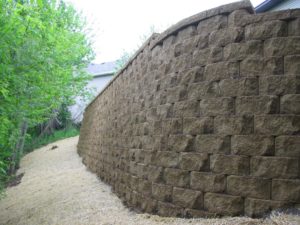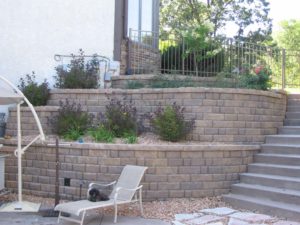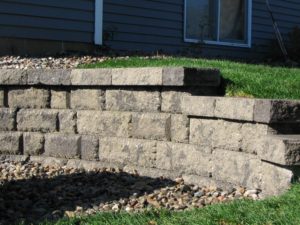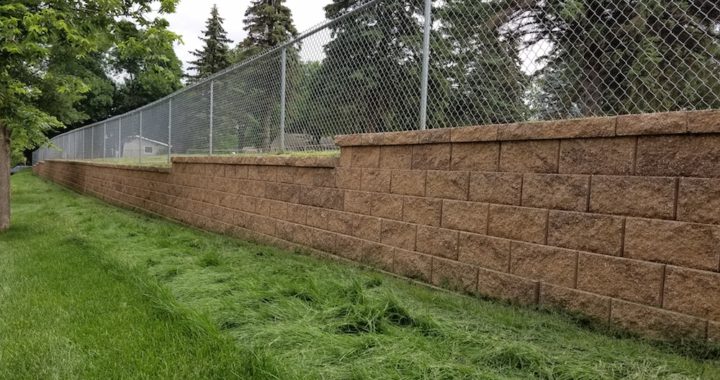If you’re considering adding a retaining wall to your yard, there are a wide variety of materials and styles to choose from, and it can be difficult to know which one to pick. Read on to learn more about your options so you can determine which retaining wall is best for your needs, budget, and style.
What Is a Retaining Wall?

A retaining wall is a man-made wall that “retains,” or holds back soil. Retaining walls are primarily used to keep soil from eroding or to create levels in sloped areas for more usable space. Depending on your soil and the amount of sloping in your yard, a retaining wall can be an essential structural element of your landscape.
But even if your yard doesn’t need shoring up, retaining walls can also be used for a more aesthetically-focused purpose—to help facilitate the design of your outdoor space. They are a great way to separate different areas in your landscaping design, such as surrounding a fire pit, pool area, garden, or patio.
In a nutshell, retaining walls add both support and style to your landscaping.
Most Common Materials For Retaining Walls

Retaining walls can be built from a variety of materials, each with their own pros and cons. The following are the most commonly used retaining wall materials:
Wood. Wood is the most economical choice for retaining wall construction. It’s not as strong as stone or concrete, but can be just as aesthetically pleasing, offering a natural look and rustic appeal. Wood retaining walls are also easy and efficient to install. The main downside to wood is that it is more susceptible to moisture than other materials (especially if it’s untreated), so it can warp or decompose over time.
If you opt for wood, your best options are treated pine, timber sleepers, or hardwood. With the right wood and proper installation, a wood retaining wall can last up to 20 years.
Stone. Stone is highly regarded as the most attractive option for a retaining wall, as it easily incorporates into the natural landscape. There are a wide range of stone types to choose from, allowing you to find one that enhances the style and aesthetics of your home and outdoor space. Stone is more expensive than wood, and construction of a stone retaining wall is more labor-intensive and time-consuming, so this option requires a larger budget. Stone can also be susceptible to erosion over time. But even so, a stone retaining wall will be a beautiful part of your landscaping for many years to come.
Concrete. Concrete is highly durable and is less expensive than stone. It can be left in its natural state or finished in a range of colors and textures to suit your home’s style. You can choose from poured concrete or a segmented block wall (also known as SRW). SRW is completely mortarless and maintenance-free, and is the most durable option for retaining wall construction. It can also be custom-designed in a variety of shapes, sizes, colors, and textures to suit your landscaping aesthetic.
Which Retaining Wall Is Best For My Yard?

While any of these materials will make for a long-lasting and attractive retaining wall, the one you choose will depend on your needs, budget, and style. Ask yourself the following questions to help narrow down your choices:
- What will the retaining wall be used for? In other words, do you need it primarily to prevent erosion or simply to create structure within your landscaping design? If the former, you’ll want to focus on matching the design to your home’s exterior, as the wall itself will be a major focal point. If the latter, you’ll want to choose your material based on the elements you will add to your landscaping after the walls are placed. You want a material that will enhance those elements as well as the overall look you’re after.
- What aesthetic are you going for? If rustic is your style, wood may be the best option for you. On the other hand, if you want a crisp, modern look, concrete will be the ideal fit. Or if classic and understated is your goal, a stone retaining wall may be just what you need. No matter your style, there is a retaining wall to match it.
- What’s your budget? How much do you want to spend on your retaining wall? Price can vary significantly among the available materials, so as you consider your options, make sure the one you choose fits within any budget constraints you have.
Trust the Pros at McDonough For Your Retaining Wall Installation
Still stumped about which retaining wall is best for you? The team at McDonough can help you choose the material that best suits your yard, design, and budget. Our National Concrete and Masonry Association-certified installers and landscape designers understand the engineering principles, soil characteristics, drainage control, and installation requirements necessary to help you choose and install a retaining wall that will beautify your outdoor space for many years to come.
Ready to discuss your retaining wall options? Contact the McDonough Landscaping team today!

